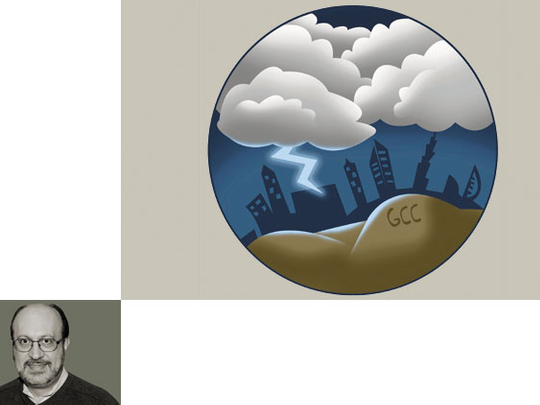
Traditionally hesitant European Union (EU) foreign ministers settled on a comprehensive oil embargo against Iran on Monday, which will become effective on July 1, and which may well draw Tehran’s ire. Unlike previous sanctions, this one will hurt, and may actually cripple the Islamic Republic. President Mahmoud Ahmadinejad and Ayatollah Ali Khamenei have repeatedly warned that such decisions — and actions — would represent a declaration of war. Are we on the verge of a fourth Gulf conflict?
It should be clear that the EU’s decision matters because of its scale. In fact, nearly a quarter of Iran’s 2.6 million barrels of daily oil production will stop flowing shortly and, should separate US sanctions succeed to coerce Japan and South Korea to stop their imports from Iran, Tehran will literally be paralysed.
Such strangulation will translate into a global financial nightmare for Iran that will then be obligated to dump its remaining oil production at discount prices to secure its large Chinese market.
India recently agreed to pay for its oil purchases from Iran in gold instead of dollars and China may follow suit. Delhi and Beijing are actually in a position to demand sharp discounts, which will further emasculate Tehran’s capabilities to bypass contemplated stricter financial controls.
Of course, Ahmadinajad is betting that neither Delhi nor Beijing will flinch, even if leaders in both capitals cannot jeopardise their economic prosperities to satisfy Iran. Their future lies with the West and they know it. Chinese Communist party leaders, in particular, are actually engaged in existential reassessments and while they acknowledge that oil imports from the Gulf region are vital to their long-term energy needs, China’s real economic security is acutely tied to open western markets that must allow continued imports of Chinese goods.
By becoming the world’s factory, China sealed its destiny with western prosperity, which is the only way that will allow the 150-200 million-strong middle-class to grow. One does not have to be a rocket scientist to figure out what would happen to 500 million Chinese workers if western markets collapsed. That is why Beijing will respect western economic sanctions against Iran. Delhi may be forced to follow suit for similar reasons.
Beyond various stratagems to bypass the upcoming embargo, Iran recently committed an egregious error when it threatened to close the strategic Strait of Hormuz, which will not be easy to mend. Revolutionary Guard Corps warnings that opposed the return of the USS John Stennis to the Gulf a few weeks ago were laughable, which necessitated a full reversal after the USS Abraham Lincoln aircraft carrier and its task force, including British and French warships, sailed through the strait.
There are now two US carriers inside the Gulf with an array of other naval assets that should lead Iranians to pose.
An equally conspicuous error was to simply raise the prospect of closing the strait, perhaps by laying mines through the 20-mile long chokepoint, which drew a forceful American rebuke. Washington allegedly communicated its sentiments in blunt language in a letter from President Barack Obama to Ayatollah Khamenei, insisting that any interruption to sea traffic in the Gulf would be a “red line” that would trigger an overwhelming military response that will also destroy Iranian nuclear facilities.
Nuclear programme
This was the crux of the matter — a putative Iranian nuclear programme — that unsettles most Westerners and that sends shivers in all GCC capitals. Regrettably, and notwithstanding claims to the contrary, the most up-to-date International Atomic Energy Agency (IAEA) assessment did not confirm that Iran had a nuclear weapons programme.
On the contrary, it noted that its inspections of Iran’s facilities showed no diversion of uranium for military purposes, something that warmongers did not believe. Trigger-happy desk-warriors like Israeli Prime Minister Benjamin Netanyahu referred matter-of-factly to the putative Iranian programme, motivated by strict dominance objectives that perceived a potential “Iranian Bomb” as an existential threat to Israel.
A public debate in Israel, about whether time may be “running out for a military strike to slow Iran’s progress toward a nuclear weapon,” was illustrative of this mind-set even when the IAEA determined otherwise.
That is not to say that Iran will not become a nuclear power — it eventually will — but that those who read sinister motives into Iranian leaders’ potential policy decisions — that they will actually use such weapons helter-skelter — are beyond irresponsible. Somehow deterrence theory, which worked for rational actors, might not apply in this case allegedly because Iranians were irrational. This type of logic was akin to the ‘known unknowns’ and ‘unknown unknowns’ determinations, which former secretary of defence Donald Rumsfeld perfected in his 2002 soliloquy, about things one does not know.
What happens next is important and it behooves Washington and its European allies to negotiate a reduction of tensions with Moscow and Beijing. The latter two, in turn, ought to engage Tehran in such ways that will further lessen anxieties all around and avoid a global calamity.
A recent declaration by Russian Deputy Foreign Minister Sergey Ryabkov, who warned that a military operation against Iran by the US and Israel would be “a very grave mistake and a severe blunder on the part of the West,” highlighted where the problem was, and where a solution might be found.
Iran, for its part, can do a lot of damage in the Gulf region and, perhaps, close the strait with about 300 or so mines. Naturally, this will be suicidal, for it will trigger a sharp response, since major powers will simply not allow the entire world to be held hostage. Objectively stated, Washington and its allies will not tolerate that the fragile global economy be incapacitated, and will use every weapon in their arsenals to prevent such a scenario from arising. Of course, Iran can avoid war, but that will probably require qualified leaders in Tehran.
Dr Joseph A. Kechichian is a commentator and author of several books on Gulf affairs.









